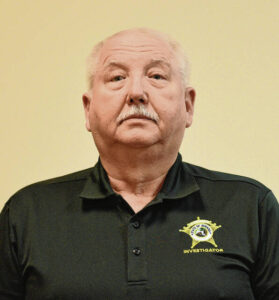1. Why are you seeking elected office? What are your strengths and weaknesses as they apply to the skills needed to serve in this office?

Vivian Jo-Lynn Grimes (R): I’m seeking the office of coroner to serve my community with professionalism, dedication and passion. I’m born and raised here so knowing the area will allow me to have a quick response to help the family who just lost their loved one. I also have the ability to form strong working relationships within the community and other communities as the need arises. My greatest weakness, which I see as a strength, is standing up and fighting for the family. With this being a tourist town there are times where families have lost loved ones here, but are from a different state.

Michael R. Moore (R): To continue the level of professionalism that has been instituted in the office of coroner by Coroner Earl Piper. I have my team already assembled for the office with training and Earl Piper will continue with the office as my chief deputy. Strength: I have been a deputy coroner since 2010 and hold a certification as a Medicolegal Death Investigator (MDI) through the Indiana Coroners Training Board since Jan. 8, 2011. I have been a deputy sheriff in Brown County since March 1990 (ILEA) and have 30 plus years of police experience and training. I also have been a certified EMT through Indiana continuously since May 24, 1979. Weaknesses: I do not feel that I will have any weaknesses in the skills needed.
2. What specific training or experience have you had that qualifies you for the office of coroner?
Grimes: I’m currently starting my 13th year in EMS. I’m currently a paramedic, which helps for this job in the following ways: understanding what EMS has done, understanding disease-causing processes, understanding medication and extensive knowledge of anatomy and physiology. It’s important to remember that this job is a two fold mission: taking care of the one who has passed away, but also the family. It comes down to two words: compassion and respect. Those two qualities you can’t learn from a book they have been instilled in you from the day you were born.
Moore: 10 plus years as a certified (MDI) deputy coroner under Coroner Earl Piper and Coroner Robert Ayers; 30 plus years as a certified Indiana police officer (ILEA); 40 plus years as an Indiana Certified EMT.
3. Rank strongly disagree to strongly agree: Qualifications for the office of coroner should be strengthened.
Grimes: Strongly agree. The more training and knowledge you have the better off you are to help others when they need you. It’s also a great way to network and build professional relationships. There will be a time perhaps several that you may not know the answer to and that’s OK. Being able to research the question and reach out to those professional relationships is what will make the difference in your career.
Moore: Neither agree nor disagree. As the elected office of coroner is a constitutional office, it would take a constitutional amendment to change the office of coroner. With that said, Indiana does have certification requirements for all coroners and deputy coroners. The Indiana Coroners Training Board oversees training requirements and the training of coroners and deputy coroners. There are also in-service training requirements for coroners and deputy coroners with annual trainings conducted by the Coroners Training Board. This process is similar to other professional organizations in Indiana.




